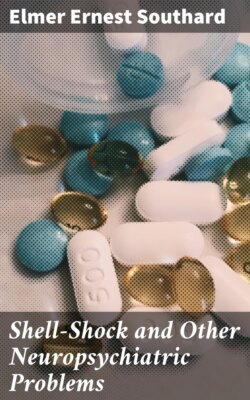Читать книгу Shell-Shock and Other Neuropsychiatric Problems - Elmer Ernest Southard - Страница 78
На сайте Литреса книга снята с продажи.
ОглавлениеEpileptic episode at 24 years following bullet-wound of hand, in a soldier who had had convulsions in childhood (sister epileptic). Reactive epilepsy? Epilepsia tarda?
Case 70. (Bonhoeffer, July, 1915.)
A man in the reserve, 24, bore the stresses of the war very well in the campaign in East Prussia until he was shot in the hand at Deutsch-Eylau. He had always been well aside from rheumatism, and was discharged with a good record from his military service.
Sent to the reserve hospital for his hand injury, he had, two or three times in the night, convulsions with loss of consciousness and dilated pupils; after which there was a thirty-six hour period of depression with refusal of food. Thereafter this soldier had amnesia for both the seizures and the subsequent depression. He was observed six weeks longer in the Charité Clinic but had no more attacks, and indeed nothing more of note either mentally or somatically.
The history showed that there had been convulsions in the third and fourth years of the patient’s life. There had been, however, nothing epileptoid in the later childhood or developmental years of the patient. However, a sister of the patient had suffered since childhood from convulsions. It remains a question whether this episode is to be regarded as reactive epilepsy—reactive, namely, to experiences in the war—or whether we are dealing with a true epilepsia tarda.
Re this episode following bullet wound, the compiler has placed it after Mairet and Piéron’s case of Brown-Séquard epilepsy, but apparently Bonhoeffer regards his case as probably a reactive one. Unlike the case of Mairet and Piéron, Bonhoeffer’s case had an epileptic soil (convulsions in childhood and epileptic sister). Re the so-called reactive epilepsies, see remarks by Bonhoeffer under Case 57.
